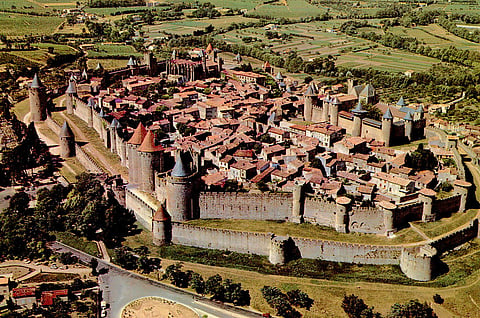
- Destinations
- Experiences
- Stay
- What's new
- Editor’s Picks
- Responsible Tourism
- CampaignsCampaigns
- Subscribe

Europe is home to beautifully preserved castles and walled cities that history and architecture enthusiasts will love to visit. When you're in France next, you must check out the medieval town of Carcassonne in south-west France, a truly awe-inspiring destination straight out of a period drama.
There is another reason to add this place to your France bucket list. Visitors to the walled hilltop citadel of Carcassonne can now walk the entire 1.3km circuit along the upper ramparts for the first time in centuries. The route was opened on September 12 to the public. This achievement is the result of a 31-month, €5.6m restoration project by the national heritage agency, the Centre des Monuments Nationaux. The Carcassone ramparts in France have never been fully accessible to the public due to safety concerns over the old walls. Incidentally, Carcassonne is believed to have been a major inspiration for the castle in Walt Disney's Sleeping Beauty.
Classified as a UNESCO Heritage Site, Carcassonne has been a settlement since the 6th century BC. According to UNESCO, in its current form, it is an exceptional example of a medieval fortified town. It features massive walls encircling the castle, surrounding buildings, streets, and a fine Gothic cathedral. Carcassonne is also important due to the extensive restoration efforts led by Viollet-le-Duc, a pioneer in modern conservation science.
The defensive system is comprised of two enclosures separated by barriers. It surrounds the houses, streets, a Gothic cathedral, a castle, and the main associated buildings. The inner ramparts have twenty-six circular towers and largely overlap the Roman defenses for two-thirds of their length. The outer ramparts have nineteen round towers, including three barbicans. The enclosure is surrounded by moats, and the two main entrances to the fortified city, the Porte Narbonnaise and the Porte de l'Aude are particularly elaborate. The 12th-century count's castle and the main associated buildings were built on the western part of the Roman ramparts. The basilica dedicated to Saints Nazaire and Celse has no flying buttresses; stability is ensured by the internal vaulted structure.
The circuit presents an unparalleled 360-degree panoramic view of the city, capturing its rich history dating back to the 13th century. As you traverse the circuit, you will be treated to a breathtaking sight of the city's multi-turreted castle, the soaring cathedral set against a backdrop of Roman-tiled roofs, and the picturesque valley of the river Aude, flanked by the majestic Black Mountains on the northern horizon.
Known as the Cité de Carcassonne or the Fortified City, this historical gem traces its origins back to the Gallo-Roman period and underwent restoration in the 19th century. Explore the city's captivating historical monuments, including the majestic Chateau Comtal with its breathtaking view of the countryside, the intricate architecture of the Basilica of St. Nazaire, and the enchanting storytelling stained glass windows of St. Celse. If you're a history or architecture enthusiast, Carcassonne promises a one-of-a-kind experience that will leave you completely mesmerised.
Located halfway between Toulouse and Narbonne, Carcassonne is a major tourist centre in the south of France in the Aude department. There are many ways to spend a couple of days here. You can explore the other old city of Carcassonne, Bastide St. Louis. It is across the bridge at the base of the old city. For a tranquil experience, book a guided boat ride on the historic Canal du Midi and enjoy fabulous views of the Citadel.
Indulge in excellent wine and a succulent regional dish at Comptoir des Vins et Terroirs inside the medieval city. This winery is located in an old historic building and has a courtyard with tables where you can relax while enjoying the food and drinks. After the sun sets, immerse yourself in Carcassonne's nightlife, which is centred mainly around rue Omer-Sarraut in La Bastide. Explore the markets if you love buying regional produce and condiments on your travels. When it comes to accommodation, be sure to book a room at the Hotel de la Cité, a beautifully crafted Neo-Gothic place tucked into the ramparts of the ancient walls. And do not forget to take a picture of the fortress from the historic Pont-Vieux bridge over the Aude river.
Entry to Carcassonne’s ramparts and chateau costs €9.50 (INR 885) for adults, €7.50 (INR 699) for reduced tickets, and free for under-18s. Entry to the old town within the ramparts is still free.
Carcassonne has an airport known as the Carcassonne or Salvaza Airport. You can take a cab or a shuttle from the airport to the town, which is around 3-and-a-half kilometres away. It is well connected by rail services to Paris - the journey takes around 6 to 7 hours.
